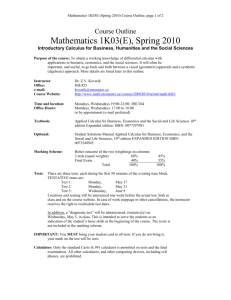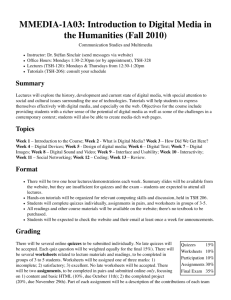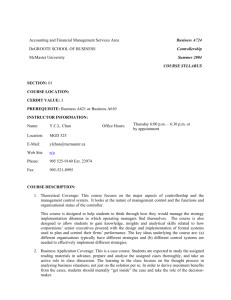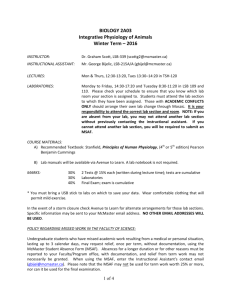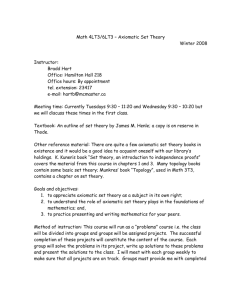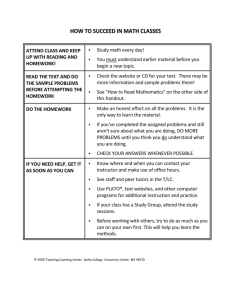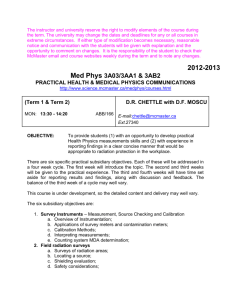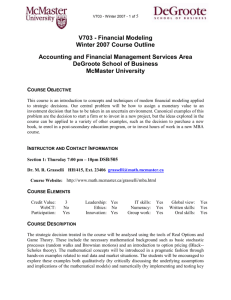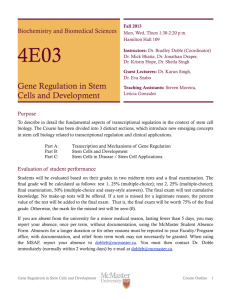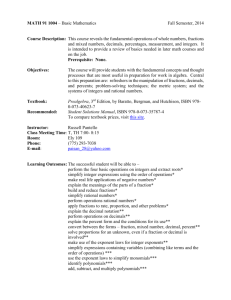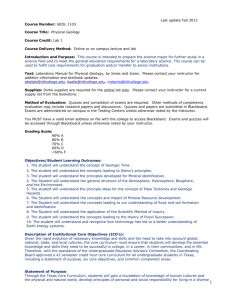Math 3G3 Problem Solving Course Outline - McMaster University
advertisement
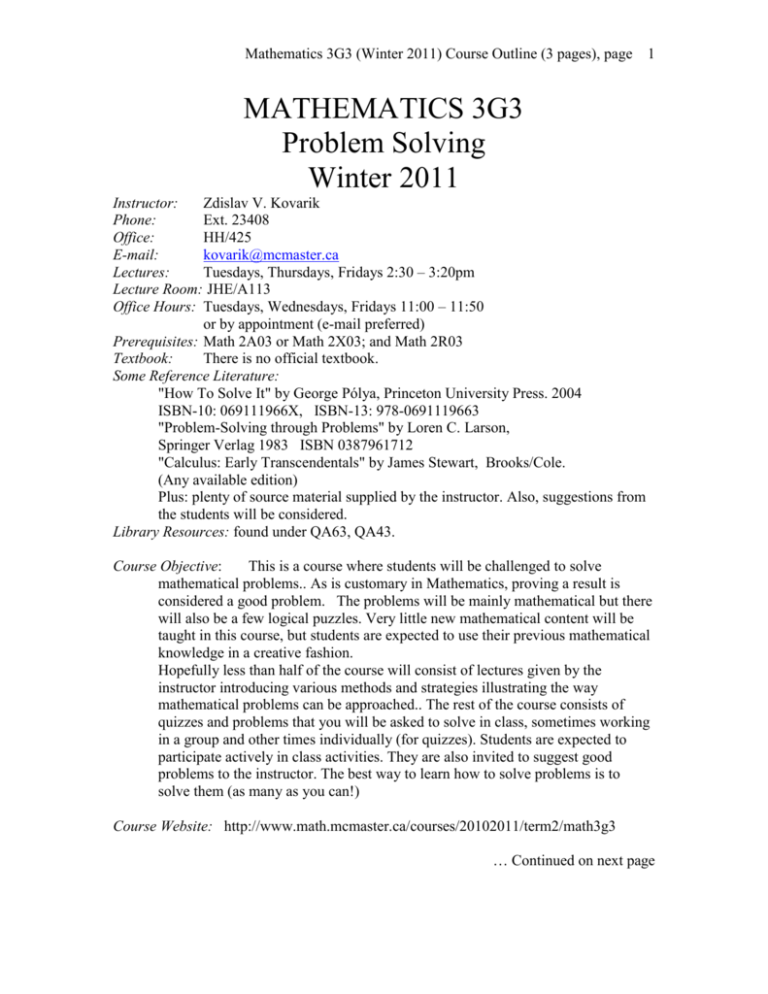
Mathematics 3G3 (Winter 2011) Course Outline (3 pages), page 1 MATHEMATICS 3G3 Problem Solving Winter 2011 Instructor: Zdislav V. Kovarik Phone: Ext. 23408 Office: HH/425 E-mail: kovarik@mcmaster.ca Lectures: Tuesdays, Thursdays, Fridays 2:30 – 3:20pm Lecture Room: JHE/A113 Office Hours: Tuesdays, Wednesdays, Fridays 11:00 – 11:50 or by appointment (e-mail preferred) Prerequisites: Math 2A03 or Math 2X03; and Math 2R03 Textbook: There is no official textbook. Some Reference Literature: "How To Solve It" by George Pólya, Princeton University Press. 2004 ISBN-10: 069111966X, ISBN-13: 978-0691119663 "Problem-Solving through Problems" by Loren C. Larson, Springer Verlag 1983 ISBN 0387961712 "Calculus: Early Transcendentals" by James Stewart, Brooks/Cole. (Any available edition) Plus: plenty of source material supplied by the instructor. Also, suggestions from the students will be considered. Library Resources: found under QA63, QA43. Course Objective: This is a course where students will be challenged to solve mathematical problems.. As is customary in Mathematics, proving a result is considered a good problem. The problems will be mainly mathematical but there will also be a few logical puzzles. Very little new mathematical content will be taught in this course, but students are expected to use their previous mathematical knowledge in a creative fashion. Hopefully less than half of the course will consist of lectures given by the instructor introducing various methods and strategies illustrating the way mathematical problems can be approached.. The rest of the course consists of quizzes and problems that you will be asked to solve in class, sometimes working in a group and other times individually (for quizzes). Students are expected to participate actively in class activities. They are also invited to suggest good problems to the instructor. The best way to learn how to solve problems is to solve them (as many as you can!) Course Website: http://www.math.mcmaster.ca/courses/20102011/term2/math3g3 … Continued on next page Mathematics 3G3 (Winter 2011) Course Outline (3 pages), page 2 Grade Weighting: Better of the two weightings as indicated in columns: Presence and participation 10% 10% 10 quizzes, total 40% 50% 5 home assignments, total 50% 40% The numbers of quizzes and assignments are tentative, Missed Assignment or Test (Quiz): For absences from classes lasting up to 5 days: Using the McMaster student absence form (MSAF) on-line, self-reporting tool, undergraduate students may report absences lasting up to 5 days and may also request relief for missed academic work. The submission of medical or other types of supporting documentation is normally not required. Students may use this tool to submit a maximum of two requests for relief of missed academic work per term. Students must immediately follow up with their course instructors regarding the nature of the relief. Failure to do so may negate the opportunity for relief. It is the prerogative of the instructor of the course to determine the appropriate relief for missed term work in his/her course. For absences from classes lasting more than five days: Students who are absent more than five days cannot use the on-line, self-reporting tool to request relief. They MUST report to their Faculty Office to discuss their situation and may be required to provide appropriate supporting documentation. If warranted, students will be approved to use a discretionary version of the MSAF on-line, self-reporting tool. Unexcused absence from an assignment or test will result in a mark of zero. More information can be found on http://www.mcmaster.ca/msaf/ Calculators and other materials: Only the officially approved calculator Casio fx991 is allowed during quizzes. Notes, books and other outside sources of information, including cell phones, are to be stored in the luggage which is left at the front of the examination room. … Continued on next page Mathematics 3G3 (Winter 2011) Course Outline (3 pages), page 3 Academic Dishonesty Academic dishonesty consists of misrepresentation by deception or by other fraudulent means and can result in serious consequences, e.g. the grade of zero on an assignment, loss of credit with a notation on the transcript (notation reads: "Grade of F assigned for academic dishonesty"), and/or suspension or expulsion from the university. It is your responsibility to understand what constitutes academic dishonesty. For information on the various kinds of academic dishonesty please refer to the Academic Integrity Policy, specifically Appendix 3, located at http://www.mcmaster.ca/senate/academic/ac_integrity.htm The following illustrates only three forms of academic dishonesty: 1. 2. 3. Plagiarism, e.g. the submission of work that is not one's own or for which other credit has been obtained. Improper collaboration in group work. Copying or using unauthorized aids in tests and examinations. Important information: “The instructor and university reserve the right to modify elements of the course during the term. The university may change the dates and deadlines for any or all courses in extreme circumstances. If either type of modification becomes necessary, reasonable notice and communication with the students will be given with explanation and the opportunity to comment on changes. It is the responsibility of the student to check their McMaster email and course websites weekly during the term and to note any changes.” END
